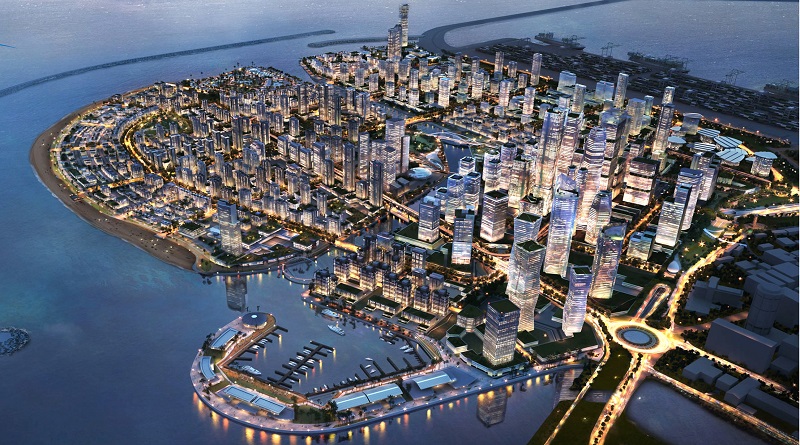
Port City Tax Breaks Raise Eyebrows amid IMF Commitments
- CNL Reporter
- July 27, 2025
- News, Political
- Port City
- 0 Comments
News of the day
Sri Lanka’s decision to grant extensive long-term tax concessions to four companies operating within the Colombo Port City has reignited debate over the country’s fiscal policy and its reform pledges under the International Monetary Fund (IMF) program.
The concessions, granted through Extraordinary Gazette notifications No. 2445/2 to 2445/5, were issued on July 14, 2025, by President Anura Kumara Dissanayake, in his capacity as Minister of Finance, Economic Stabilisation, and National Development.
These gazettes designate the selected companies as “Authorised Persons” and “Businesses of Strategic Importance” under the Colombo Port City Economic Commission Act, qualifying them for sweeping tax relief under the Inland Revenue Act, as well as other laws governing indirect taxes, employment regulations, and foreign exchange.
The decision, however, comes despite earlier assurances given by Sri Lanka to the IMF under the Extended Fund Facility (EFF) that no new tax exemptions would be granted under outdated laws like the Strategic Development Projects (SDP) Act or the Port City Act until revised legislation is passed later this year.
Scope of the Tax Concessions
Under the gazetted concessions, all four companies are granted complete exemption from:
Income Tax, Profits Tax, and Dividends Tax for 25 years
Withholding Tax on all payments during this period
Value Added Tax (VAT), Customs Duties, Excise Duties, Port and Airport Development Levy (PAL), and other levies under key financial laws for 25 years
A 50% corporate income tax reduction for a further 10 years thereafter
These tax benefits under the Inland Revenue Act are valid until July 13, 2060, while exemptions under other statutes continue until July 13, 2050.
The Beneficiary Companies and Their Projects
1. Ceylon Real Estate Holdings (Private) Limited
Affiliation: Subsidiary of Browns Investments PLC, the strategic investment arm of LOLC Holdings
Project: Business and commercial city complex on Mixed Use Plot 1-02-01 (30,630 sqm)
Investment: USD 411 million in construction and project costs + LKR 32.15 billion for land
This flagship Port City project will feature Grade An office space (53,602 sqm), retail spaces (22,972 sqm), and luxury residences (84,232 sqm). It aims to host 4,000–6,000 professionals and attract industries such as finance, IT, logistics, and energy. The project is expected to generate significant foreign investment and employment opportunities.
2. Clothespin Management and Development (Private) Limited
Origin: Sri Lankan-incorporated entity with international affiliations, believed to be operated from Dubai
Project: Iconic twin-tower development on Hotel Use Plot 2-01-11 (24,324 sqm)
Investment: USD 540.1 million (USD 75M for land, USD 465.1M for construction and pre-ops)
The ambitious “Clothespin Towers” project promises ultra-luxury residences, a seven-star hotel, premium retail, fine dining, and the world’s largest art gallery. The towers are designed for LEED Gold certification, incorporating green building features. The company plans to recruit 280 employees in the first year of operations.
3. IFC Colombo (Private) Limited
Affiliation: Subsidiary of CHEC Port City Colombo (Private) Ltd., owned by China Harbour Engineering Company (CHEC), a subsidiary of China Communications Construction Company (CCCC)
Project: Mixed-use real estate development on Plot 1-01-02 (12,561 sqm)
Investment: USD 142.71 million (USD 94.98M construction + USD 47.73M land)
This project will integrate commercial, retail, and residential elements, targeting global investors and business tenants. The development includes the establishment of a trading office and aims to support tourism and tech-enabled urban amenities in the Port City.
4. ICC Port City (Private) Limited
Parent Company: International Construction Consortium (Private) Limited (ICC), a leading Sri Lankan construction firm
Project: High-end residential development on Plot 1-02-05 (13,945 sqm)
Investment: USD 66 million + LKR 13.8 billion
ICC Port City will construct two luxury apartment towers and five upscale villas, marketed to high-net-worth individuals, expatriates, and international investors. The company plans to employ 8 direct and 343 indirect workers in the first year, scaling up over time as construction progresses.
IMF Warning and Policy Contradictions
While these projects are framed as strategic development initiatives, the IMF has consistently cautioned Sri Lanka against offering arbitrary tax exemptions under outdated legislation. In its Fourth Review Staff Report (July 2025), the IMF reiterates concerns that such exemptions erode the tax base, encourage rent-seeking and corruption, and reduce investor confidence by lacking transparency and accountability.
Sri Lanka had committed to the IMF to halt all new exemptions under the Port City and SDP Acts until October 2025, when amendments to these laws are expected to be tabled in Parliament. These reforms are part of a broader structural benchmark under the IMF program aimed at establishing rule-based, transparent investment incentive frameworks.
Furthermore, in the Memorandum of Economic and Financial Policies (MEFP) submitted to the IMF on July 3, the government acknowledged that 24 companies—including four primary businesses, three duty-free businesses, and 17 secondary businesses—had already received tax concessions without prior consultation with the IMF. This was in violation of a previously agreed moratorium on such exemptions from January to September 2024.
Broader Implications
Despite the potential of these projects to attract foreign direct investment, create jobs, and boost Port City’s global appeal, analysts warn that undermining IMF reform conditions could jeopardize ongoing debt restructuring and future IMF disbursements. The challenge lies in balancing strategic economic development with fiscal discipline and institutional integrity.
Business leaders and policy analysts have called for greater transparency in the incentive approval process, including disclosure of ownership structures, employment guarantees, and project evaluation criteria. Civil society groups and lawmakers are urging the government to ensure that investment promotion is carried out equitably and accountably, in line with international obligations.
Conclusion
The tax exemptions granted to the four Port City firms reflect Sri Lanka’s aspirations to attract high-profile global investment, particularly in luxury real estate, technology, and logistics. However, the timing and manner of these incentives raise critical concerns about governance and policy consistency, particularly in the context of Sri Lanka’s ongoing IMF program.
As amendments to the Port City and SDP Acts are due by October 2025, stakeholders will be watching closely to ensure that future investment incentives are granted under a transparent, rules-based regime—one that supports both economic growth and the country’s broader fiscal reform agenda.

